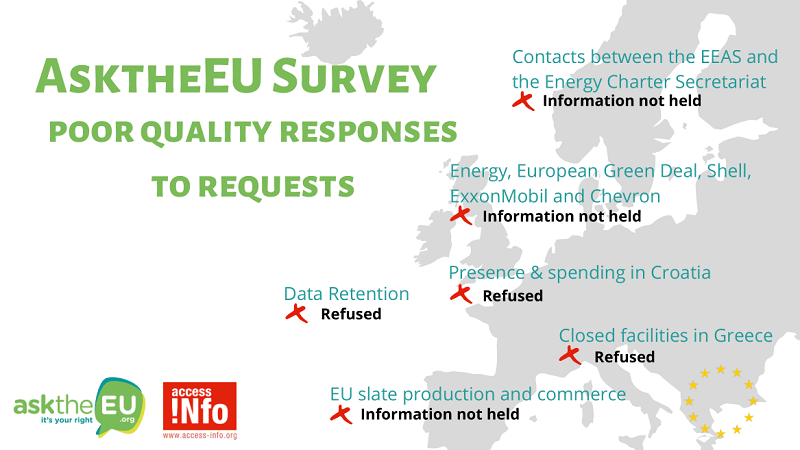A survey of 95 users of the request platform AsktheEU.org, carried out by the Access Info team in February 2020, has found that three quarters (75%) report being increasingly disappointed with EU authorities’ responses, both in terms of the long delays in receiving answers and being dissatisfied with the information provided.
A second key finding is that requesters do not feel that they have sufficient legal expertise to challenge appeals against responses they are not happy with, with 70% never having made an administrative appeal (a “confirmatory application”).
The third main finding of the survey is that requesters are unhappy with having to identify themselves when it is not clear how their personal data will be used nor how it will affect treatment of the request. Some potential requesters (15%) desisted when asked by the Commission for a postal address, while others (20%) used a work address, expressing concern that when investigating corruption giving your home address can be problematic.
Helen Darbishire, Executive Director of Access Info Europe commented: “Our survey has revealed that most users persist in making requests, in spite of the obstacles placed in their way, the delays, and the often unsatisfactory responses. Nevertheless, Access Info needs to help empower requesters with a better knowledge of their rights and provision of legal support to challenge refusals.”
Finding 1: Unsatisfactory Reponses
The main problems according to respondents are that institutions reply with long delays (30%), that information provided is not exactly what was asked for (41%), and that access is denied in a way that appears to be unreasonable (38%).
Of these, over one third (38%) of respondents are not satisfied with responses, while a further third (37%) had mixed experiences. Regular users reported a decline in the quality of answers, leading them to speculate that there is a lack of political will to provide information.
Finding 2: The Need to Support Legal Appeals
The survey revealed the need to provide more support to users to challenge refusals and unsatisfactory answers, given that 70% have never even made an administrative appeal (“confirmatory application”), and most, 80% had never taken a complaint to the European Ombudsman or Court of Justice of the European Union.
The lack of legal challenges could be because users don’t feel sure of their rights. Indeed, the survey found that more than half of AsktheEU.org users (60%) are uncertain of their rights when requesting documents, with almost half (46%) not sure whether authorities can extend the timeframe for replying, and a quarter (25%) not sure about deadlines for making appeals.
Finding 3: Concerns about privacy
It was striking how concerned users are about being required to provide their personal information, such as a postal address, in order to make a request, as required by the Commission in spite of a European Ombudsman recommendation not to do so. Whilst Access Info does offer the service of hiding postal addresses after they have been sent, it is definitely a disincentive to using AsktheEU.org, with 15% of users not making a request. Another 42% of users said that they felt uncomfortable about having given their postal address.
Users commented that the risk that personal data might be online could cause problems for anti-corruption and human rights activists in various parts of Europe, with users in Hungary noting particular problems.
Another concern that users raised is the Frontex practice of requiring a copy of an ID document, which some commented feels abusive and they expressed concerns that this could result in differential treatment of requests.
“AsktheEU.org aims to make requests and answers transparent so that once information has been released, it is available to all. This is a public service, and the exercise of a fundamental right, and so it really should not matter at all who the requester is. The EU’s insistence that requesters provide an ID or postal address makes it seem as if the authorities are trying to control who is asking and to dissuade them from doing so,” commented Helen Darbishire.
Next Steps for Access Info
This survey has been very useful for Access Info in planning how to improve the Access Info service, and we thank all those who took part in the survey.
The specific actions that we will be taking as follow up include:
- Providing more explanations on the rights of users on the AsktheEU.org blog;
- Conducting trainings for journalists, CSOs, academics and other users;
- Providing legal reference materials as well as pro bono legal support for appeals;
- Monitoring more closely the patterns of problems that AsktheEU.org report on and raising concerns with the relevant institutions and/or the European Ombudsman.
- Launch the AsktheEU.org PRO service for regular requesters to help manage requests more easily.
Access Info also noted that 70% of the survey respondents were men, and this is a matter of concern to us, even though the reasons for that imbalance are not clear. We will be reaching out and encouraging a wider range of requesters and more women to use the AsktheEU.org service.
What you can do
- If you want to learn about your right to request information as a European citizen, stay tuned for our next article on the AsktheEU.org! We will talk about our rights and explain how much useful Regulation 1049/2001 can be!
- Willing to help? If you would like to contribute with related content or have any idea on how to get involved more people, please write us at team[at]asktheeu[dot]org. We would be happy to hear from you!

